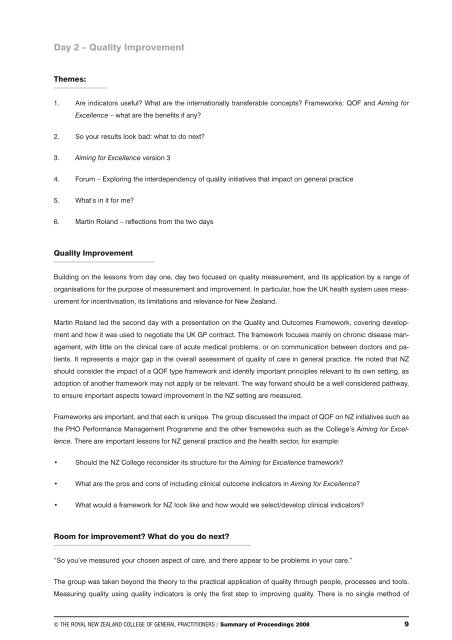Occasional Paper 10 - The Royal New Zealand College of General ...
Occasional Paper 10 - The Royal New Zealand College of General ...
Occasional Paper 10 - The Royal New Zealand College of General ...
You also want an ePaper? Increase the reach of your titles
YUMPU automatically turns print PDFs into web optimized ePapers that Google loves.
Day 2 – Quality Improvement<br />
<strong>The</strong>mes:<br />
1. Are indicators useful? What are the internationally transferable concepts? Frameworks: QOF and Aiming for<br />
Excellence – what are the benefits if any?<br />
2. So your results look bad: what to do next?<br />
3. Aiming for Excellence version 3<br />
4. Forum – Exploring the interdependency <strong>of</strong> quality initiatives that impact on general practice<br />
5. What’s in it for me?<br />
6. Martin Roland – reflections from the two days<br />
Quality Improvement<br />
Building on the lessons from day one, day two focused on quality measurement, and its application by a range <strong>of</strong><br />
organisations for the purpose <strong>of</strong> measurement and improvement. In particular, how the UK health system uses measurement<br />
for incentivisation, its limitations and relevance for <strong>New</strong> <strong>Zealand</strong>.<br />
Martin Roland led the second day with a presentation on the Quality and Outcomes Framework, covering development<br />
and how it was used to negotiate the UK GP contract. <strong>The</strong> framework focuses mainly on chronic disease management,<br />
with little on the clinical care <strong>of</strong> acute medical problems, or on communication between doctors and patients.<br />
It represents a major gap in the overall assessment <strong>of</strong> quality <strong>of</strong> care in general practice. He noted that NZ<br />
should consider the impact <strong>of</strong> a QOF type framework and identify important principles relevant to its own setting, as<br />
adoption <strong>of</strong> another framework may not apply or be relevant. <strong>The</strong> way forward should be a well considered pathway,<br />
to ensure important aspects toward improvement in the NZ setting are measured.<br />
Frameworks are important, and that each is unique. <strong>The</strong> group discussed the impact <strong>of</strong> QOF on NZ initiatives such as<br />
the PHO Performance Management Programme and the other frameworks such as the <strong>College</strong>’s Aiming for Excellence.<br />
<strong>The</strong>re are important lessons for NZ general practice and the health sector, for example:<br />
• Should the NZ <strong>College</strong> reconsider its structure for the Aiming for Excellence framework?<br />
• What are the pros and cons <strong>of</strong> including clinical outcome indicators in Aiming for Excellence?<br />
• What would a framework for NZ look like and how would we select/develop clinical indicators?<br />
Room for improvement? What do you do next?<br />
“So you’ve measured your chosen aspect <strong>of</strong> care, and there appear to be problems in your care.”<br />
<strong>The</strong> group was taken beyond the theory to the practical application <strong>of</strong> quality through people, processes and tools.<br />
Measuring quality using quality indicators is only the first step to improving quality. <strong>The</strong>re is no single method <strong>of</strong><br />
© THE ROYAL NEW ZEALAND COLLEGE OF GENERAL PRACTITIONERS / Summary <strong>of</strong> Proceedings 2008 9

















